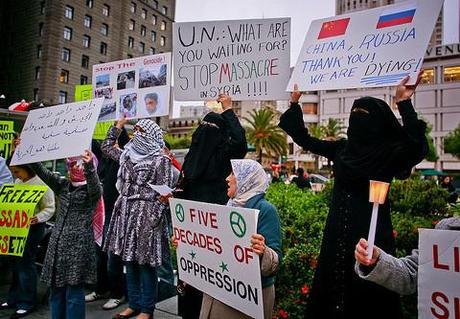
Protestors against the Syrian regime. Photocredit: bleu man http://www.flickr.com/photos/bleuman/5706363368/sizes/l/in/photostream/
Syria is looking increasingly isolated on the world stage. Protests began in January 2011; a full-scale uprising in March. The protestors are demanding that President Bashar al-Assad step down. He and his regime, however, have responded with violence. The UN estimates that over 3,500 people have been killed. The rebels, now called the Free Syrian Army and based partly in Lebanon, have made a concerted attack. They mounted their most audacious one so far, on the 16th November, on an air force intelligence base in the North of Damascus. This raises the possibility, said Jon Leyne on BBC News, of a “full-scale civil war.” The official Syrian news round up continues to call the protestors and rebels “terrorists.” Commentators are arguing for tougher sanctions economically, and not ruling out the possibility of intervention.
The pressure on Assad is rising: King Adbullah of Jordan has urged Assad to leave. The 22-member Arab League has suspended Syria, after it didn’t comply with a peace plan – a “bitter rebuke,” said Alex Spillius in The Daily Telegraph, for a nation that sees itself a “bastion of Arab nationalism.” The Arab League’s vote, said Gamal Abdel Gawad, an Arab affairs expert, shows that the Arab world is “scrambling to influence” the new regime. It’s a strategically important zone, with borders on Israel and a critical link to Lebanon. Syria’s allies in Russia and China are also keen not to see their interests in the Middle East compromised; on the other hand, Saudi Arabia, an ally of the United States of America, has been desperate to break Syria’s alliance with Iran for ages.
Crowds of pro-Assad demonstrators in Damascus have attacked the embassies of Morocco and the United Arab Emirates; whilst France and Morocco are withdrawing their ambassadors. France, meanwhile, is in talks with they Syrian opposition to find a viable replacement for the current regime.
“[E]verything must be done to stop the continuing bloodshed in Syria,” said Nabil al-Arabi, the Arab League chief, quoted on Taiwan News.
Syria now has three days to end the repression of protestors, or it will face economic sanctions. The Arab League also wants to send 500 monitors, from human rights groups, the media, and military observers, to the country. British Prime Minister David Cameron has been asked to lead discussions about more robust action against Syria, as Britain and France are seen as better leaders than America because of their proximity to the region, and because of the successful intervention in Libya.
“Leaving it all up to us you are going to get a lot of shenanigans. If you need a team captain on this you have got to go to the West,” a senior Arab diplomatic source said, quoted on The Daily Telegraph.
Tougher sanctions needed. The Arab League may be “dominated by autocrats”, said an editorial in The New York Times, but it should realize that stability in the region is key. Whilst the US and the European Union have already imposed penalties, so far Russia and China have prevented the UN Security Council from instituting sanctions – or even properly condemning Assad’s rule. It’s about time that Russia and China agreed to “tough sanctions”, and Assad and his regime should be sent to the International Criminal Court for “crimes against humanity.” Assad will destroy Syria, just to cling on to power. All “civilized countries” should stand with the people of Syria – “before it’s too late.”
What kind of sanctions? At least, said a Bloomberg editorial, the Arab League has “shed its milquetoast image.” But will there be “more concrete changes”? Some might say this is a “defensive move” on behalf of the Arab League, but it at least means that Europe and the US can ratchet up the pressure, and also means that Iran, China and Russia can’t paint sanctions as “international meddling.” There are signs, though, reported BBC News, that Russia may be stirring, with Sergei Lavrov, the Foreign Minister, calling for an end to the violence. Though the uprising, continued Bloomberg, is escalating, it’s still nothing like what it was in Libya, which is why intervention isn’t yet possible – an option that shouldn’t be discarded, though. However, until then, we should be looking at destabilising Assad’s regime further through control of the purse strings – sanctioning companies associated with Assad, barring exports to Syria, freezing assets and stopping imports of Syrian oil to Europe.
And yet more. Still more can be done, the editorial continued: America could prevent companies involved with the Syrian energy sector from gaining access to American finance, whilst Europe could ban other imports, and Turkey could cut off the energy it supplies (though this would be more of a “symbolic” gesture, since Syria can supply itself with electricity.) We shouldn’t “embarrass” Russia and China with a UN Security Council vote on embargos, but encourage them to understand that being on Syria and Iran’s side is not a long-term prospect. Though such proposals will fall hardest on the average Syrian, its unlikely that they will then turn back to the government. Assad’s grip is slipping.
It’s working already. And such sanctions are already having an effect, said Stephen Starr on Foreign Policy. Tourism has ceased; the state sector is “overburdened”, deposits in private banks have declined 18 per cent. Syrian banks can’t access international ones, and credit card companies have all left; Turkish clothes can’t be found. The price of cigarettes has rocketed, and diesel oil has doubled in cost. And whilst the government has promised to increase its spending, with oil revenues dropping, one wonders where they’ll get the money from. Many thousands are out of work. “Fear of the future is palpable.”

